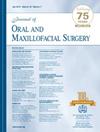Aromatherapy on Anxiety, Pain, and Quality of Life Following Surgery of Mandibular Third Molars: A Randomized, Double-Blind Clinical Trial
IF 2.3
3区 医学
Q2 DENTISTRY, ORAL SURGERY & MEDICINE
引用次数: 0
Abstract
Background
The control of anxiety is significant in the management of mandibular third molar removal surgery and may impact patients' pain.
Purpose
This study aimed to measure the effects of aromatherapy on the control of anxiety, pain, and quality of life in lower third molar removal surgery.
Study design
From 2023 to 2024, a double-blinded randomized clinical trial was performed on patients with indications for removal of unilateral mandibular third molars at our institution. Subjects were excluded if they received additional mandibular teeth extractions, were unable to complete the questionnaire, or had medical contraindications.
Predictor variable
The predictor variable is aromatherapy exposure, and subjects were randomly assigned to lavender oil or distilled water. Each patient underwent an aromatherapy session in a closed room, with the diffuser turned on 30 minutes before the patient's entry following its use during the operation.
Main outcome variables
The outcome variables were pain measured using a visual analog scale, anxiety measured using the Dental Anxiety Scale questionnaire, and quality of life measured using the Oral Health Impact Profile questionnaire. The outcomes were measured preoperatively and 7 days after the operation.
Covariates
The covariates are hemodynamic parameters, sex, age, race, educational level, and family income.
Analyses
Mann-Whitney independent test (between groups) or Friedman/Dunn and Wilcoxon's test (intragroup analysis); the statistical significance was set at P < .05.
Results
The study sample included 32 patients (17 female [53%] and 15 male [47%], mean age 24.72 ± 4.63 years). The peak of pain in both groups was observed 2 hours after surgery, with a reduction after 12 hours, and there were no differences between the 2 groups about pain (P = .9). Regarding anxiety control and hemodynamic parameters, there was an improvement in both groups, with a reduction of 2 points in the score (P = .011).
Conclusions
Aromatherapy is not statistically significantly effective compared to distilled water in reducing pain and improving quality of life. However, it showed favorable results in reducing anxiety and hemodynamic parameters.
芳香疗法对下颌第三磨牙术后焦虑、疼痛和生活质量的影响:一项随机、双盲临床试验。
背景:焦虑的控制在下颌第三磨牙拔除手术中具有重要意义,并可能影响患者的疼痛。目的:本研究旨在测量芳香疗法对下第三磨牙拔除手术中焦虑、疼痛和生活质量的控制效果。研究设计:从2023年到2024年,对我院有单侧下颌第三磨牙拔除指征的患者进行双盲随机临床试验。如果受试者接受了额外的下颌拔牙,无法完成问卷调查,或有医疗禁忌症,则排除受试者。预测变量:预测变量是芳香疗法暴露,受试者被随机分配使用薰衣草油或蒸馏水。每位患者在一个封闭的房间里接受芳香疗法,在患者进入前30分钟打开扩散器,在手术期间使用。主要结果变量:结果变量是使用视觉模拟量表测量疼痛,使用牙科焦虑量表问卷测量焦虑,使用口腔健康影响问卷测量生活质量。分别于术前和术后7天进行观察。协变量:协变量为血流动力学参数、性别、年龄、种族、教育程度和家庭收入。分析:Mann-Whitney独立检验(组间)或Friedman/Dunn and Wilcoxon检验(组内分析);结果:共纳入32例患者,其中女性17例(53%),男性15例(47%),平均年龄(24.72±4.63)岁。两组疼痛高峰均出现在术后2小时,术后12小时疼痛高峰有所下降,两组疼痛差异无统计学意义(P = .9)。在焦虑控制和血流动力学参数方面,两组均有改善,得分降低2分(P = 0.011)。结论:与蒸馏水相比,芳香疗法在减轻疼痛和改善生活质量方面没有统计学上的显著效果。然而,它在减少焦虑和血流动力学参数方面显示出良好的效果。
本文章由计算机程序翻译,如有差异,请以英文原文为准。
求助全文
约1分钟内获得全文
求助全文
来源期刊

Journal of Oral and Maxillofacial Surgery
医学-牙科与口腔外科
CiteScore
4.00
自引率
5.30%
发文量
0
审稿时长
41 days
期刊介绍:
This monthly journal offers comprehensive coverage of new techniques, important developments and innovative ideas in oral and maxillofacial surgery. Practice-applicable articles help develop the methods used to handle dentoalveolar surgery, facial injuries and deformities, TMJ disorders, oral cancer, jaw reconstruction, anesthesia and analgesia. The journal also includes specifics on new instruments and diagnostic equipment and modern therapeutic drugs and devices. Journal of Oral and Maxillofacial Surgery is recommended for first or priority subscription by the Dental Section of the Medical Library Association.
 求助内容:
求助内容: 应助结果提醒方式:
应助结果提醒方式:


